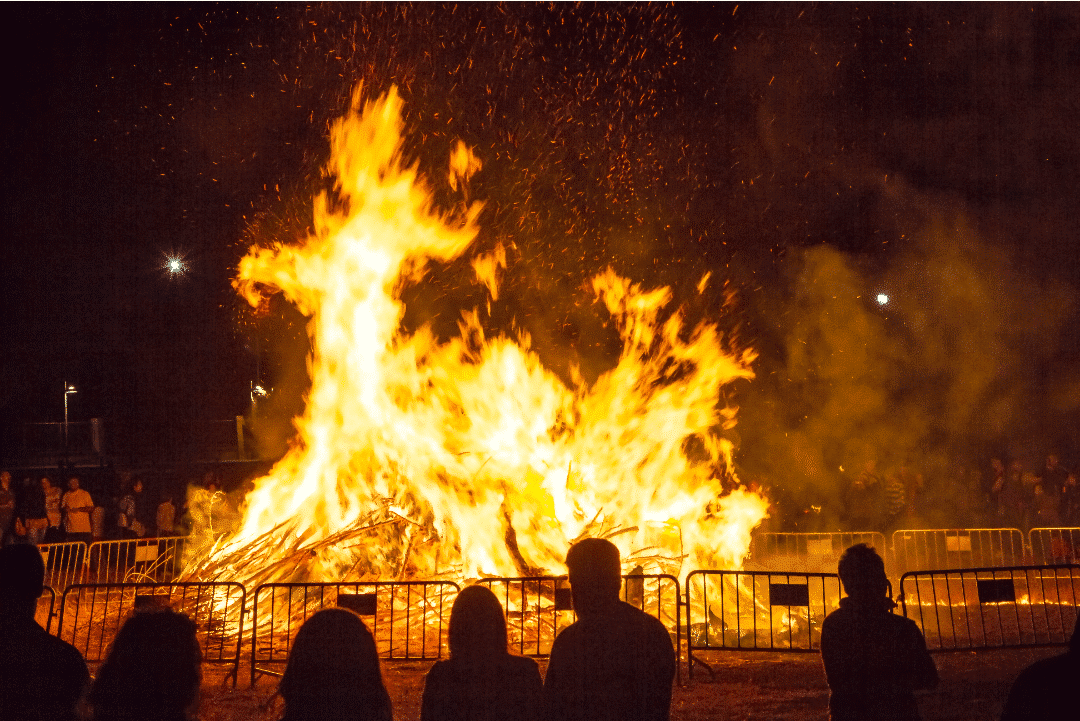Ah, the crisp chill in the air, the smell of burning wood, and the night sky filled with colorful fireworks — there’s nothing quite like Bonfire Night in the United Kingdom. Every November 5th crowds gather to celebrate this strange tradition, which is also known as Guy Fawkes Night or Firework Night. So, let’s dive into the origins and traditions of The UK’s very own San Juan.
The Gunpowder Plot
The story behind Bonfire Night dates back to the early 17th century. A man named Guy Fawkes aimed to assassinate King James I and destroy the Houses of Parliament. The plot was foiled when authorities discovered Fawkes hiding below the House of Lords, guarding a pile of gunpowder.
In the aftermath, people celebrated and lit bonfires across London on the night of November 5th, 1605, as thanks for the King’s survival. The tradition quickly spread across England and has happened every year since.
Traditions
Whilst the traditions have changed over the years, there are 3 main parts to a successful Bonfire Night.
Bonfires
It is called Bonfire Night, so obviously we need a bonfire. But what is a bonfire? As the name suggests it is a type fire. They are open-air and quite large. When I was young it was traditional that people would have smaller bonfires in their own gardens, however now it’s more typical that people attend larger, organised bonfires in parks, the countryside, etc.
Guy Fawkes Effigies
Many people create «Guys» by filling old clothes with newspaper to represent Guy Fawkes. They are then put in prominent locations or moved around the local area, where people give «a penny for the Guy» to raise funds for fireworks or treats. Once the bonfire is burning, the “Guy” is then tossed onto it to burn.
Fireworks
Similar to San Joan, on Bonfire Night the sky it ablaze with incredible colours and displays from the fireworks, however it’s not quite on the scale of Sant Juan. Plus in the UK there are more restrictions on the sale and use of fireworks, so now it’s far rarer for people to buy and use fireworks themselves, instead choosing to go to larger, organised displays.
Would you like to go to a Bonfire Night celebration? If you do, remember to wrap up warm as it’s cold in the UK in November.
Ben
Key Vocabulary
- Crisp (Adjective): To describe cold weather or a cold atmosphere, it means the air or temperature is refreshingly cool, clear, and invigorating. It often conveys a sense of clarity and freshness
- Dive into (Verb Phrase): To begin or engage in something enthusiastically or with great energy, often indicating a strong commitment or involvement.
- To date back to (Phrasal Verb): To have its origin or existence from a particular point in the past, indicating the historical or temporal origin of something.
- To foil (Verb): To prevent or hinder the success of a plan, plot, or action, often through clever or strategic means.
- Aftermath (Noun): The period following a significant event, often characterized by the consequences, results, or effects of that event.
- Effigy (Noun): A sculpture, model, or representation of a person, often created for symbolic or ritualistic purposes.
- To toss (Verb): To throw something lightly or casually, often with a quick or abrupt motion.
- Ablaze (Adjective): On fire or in flames; figuratively, it can also mean filled with intense emotion, passion, or excitement.





